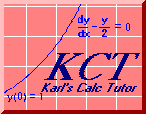

Adding the Exponents: If b is any positive real number then
bx by = bx+yfor all x and y. This is the single most important identity concerning logs and exponents. Since ex is only a special case of an exponential function, it is also true that
ex ey = ex+y
Multiplying the Exponents: If b is any positive real number then
(bx)y = bxy
for all x and y. Again since ex
is a special case of an exponential function, it is also true that
(ex)y = exy
Converting to roots to exponents: The nth root of x is the same as
x1/nfor all positive x. Since square roots are a special case of nth roots, this means that
_
Öx = x1/2
In addition:
__
Öex = ex/2
Converting to ex form: If b is any positive real number then
bx = ex ln(b)for all x. This includes the case where you have xx:
xx = ex ln(x)or if you have f(x)x
f(x)x = ex ln(f(x))or if you have xf(x):
xf(x) = ef(x) ln(x)or if you have f(x)g(x)
f(x)g(x) = eg(x) ln(f(x))As an example, suppose you had
e(1/x) ln(x2 + 1)
ex is its own derivative: The derivative of ex is ex. This is the property that makes ex special among all other exponential functions.
ex is always positive:
You can put in any x, positive or negative, and ex
will always be greater than zero. When x is positive,
The log of the product is the sum of the logs: Let b, x, and y all be positive real numbers. Then
logb(xy) = logb(x) + logb(y)This is the most important property of logs. Since
loge(xy) = ln(xy) = loge(x) + loge(y) = ln(x) + ln(y)
The log of the reciprocal is the negative of the log: For any positive b, x, and y
logb(1/x) = -logb(x) logb(y/x) = logb(y) - logb(x)This includes
ln(1/x) = -ln(x) ln(y/x) = ln(y) - ln(x)
Concerning multiplying a log by something else: Let b and x be positive and k any real number. Then
k logb(x) = logb(xk)This includes
k ln(x) = ln(xk)It also means that
_
logb(Öx) = (1/2)logb(x)
and
_
ln(Öx) = (1/2)ln(x)
Converting log bases to natural log You can compute any base log using the natural log function (that is ln) alone. If b and x are both positive then
ln(x)
logb(x) =
ln(b)
Every log function is the inverse of some exponential function: If b is any positive real number, then
blogb(x) = logb(bx) = xThe right-hand part of this equation is true for all x. The left-hand part is true only for positive x. The functions, ex and ln(x) are also inverses of each other.
eln(x) = ln(ex) = xThe same rules for x apply as above.
The derivative of the natural log is the reciprocal: If x is positive, it is always true that the derivative of ln(x) is 1/x.
To find the derivative of logs of other bases, apply the conversion rule. So for the derivative of logb(x) you end up with
1
x ln(b)
The natural log can be expressed as a limit: For all positive x
xh - 1
ln(x) = lim
h -> 0 h
You can only take the log of positive numbers: If x is negative or zero, you CAN'T take the log of x -- not the natural log or the log of any base. In addition, the base of a log must also be positive. As x approaches zero from above, ln(x) tends to minus infinity. As x goes to positive infinity, so does ln(x). So ln(x) has no limit as x goes to infinity or as x goes to zero.
Natural log is positive or negative depending
upon whether x is greater than or less than 1:
If
There is no formula for the log of a sum:
Don't go saying that
email me at hahn@netsrq.com